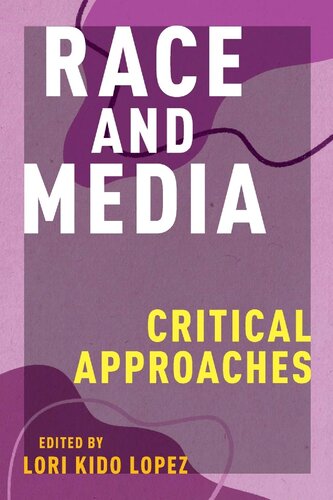

Most ebook files are in PDF format, so you can easily read them using various software such as Foxit Reader or directly on the Google Chrome browser.
Some ebook files are released by publishers in other formats such as .awz, .mobi, .epub, .fb2, etc. You may need to install specific software to read these formats on mobile/PC, such as Calibre.
Please read the tutorial at this link: https://ebookbell.com/faq
We offer FREE conversion to the popular formats you request; however, this may take some time. Therefore, right after payment, please email us, and we will try to provide the service as quickly as possible.
For some exceptional file formats or broken links (if any), please refrain from opening any disputes. Instead, email us first, and we will try to assist within a maximum of 6 hours.
EbookBell Team

0.0
0 reviewsA foundational collection of essays that demonstrate how to study race and media
From graphic footage of migrant children in cages to #BlackLivesMatter and #OscarsSoWhite, portrayals and discussions of race dominate the media landscape. Race and Media adopts a wide range of methods to make sense of specific occurrences, from the corporate portrayal of mixed-race identity by 23andMe to the cosmopolitan fetishization of Marie Kondo. As a whole, this collection demonstrates that all forms of media―from the sitcoms we stream to the Twitter feeds we follow―confirm racism and reinforce its ideological frameworks, while simultaneously giving space for new modes of resistance and understanding.
In each chapter, a leading media scholar elucidates a set of foundational concepts in the study of race and media―such as the burden of representation, discourses of racialization, multiculturalism, hybridity, and the visuality of race. In doing so, they offer tools for media literacy that include rigorous analysis of texts, ideologies, institutions and structures, audiences and users, and technologies. The authors then apply these concepts to a wide range of media and the diverse communities that engage with them in order to uncover new theoretical frameworks and methodologies. From advertising and music to film festivals, video games, telenovelas, and social media, these essays engage and employ contemporary dialogues and struggles for social justice by racialized communities to push media forward.
Contributors include:
Mary Beltrán
Meshell Sturgis
Ralina L. Joseph
Dolores Inés Casillas
Jennifer Lynn Stoever
Jason Kido Lopez
Peter X Feng
Jacqueline Land
Mari Castañeda
Jun Okada
Amy Villarejo
Aymar Jean Christian
Sarah Florini
Raven Maragh-Lloyd
Sulafa Zidani
Lia Wolock
Meredith D. Clark
Jillian M. Báez
Miranda J. Brady
Kishonna L. Gray
Susan Noh